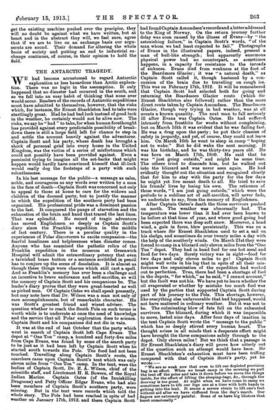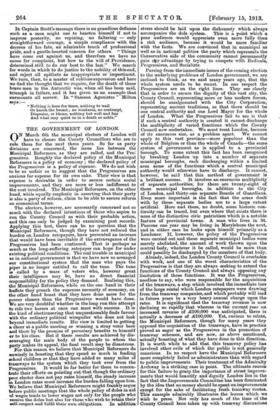THE ANTARCTIC TRAGEDY.
WE had become accustomed to regard Antarctic exploration as less hazardous than Arctic explora- tion. There was no logic in the assumption. It only happened that no disaster had occurred in the south, and so we fell into an easy habit of thinking that none ever would occur. Readers of the records of Antarctic expeditions must have admitted to themselves, however, that the risks which, for instance, Sir Ernest Shackleton had to take were startlingly great. Had he had bad luck instead of good luck in the weather, he certainly would not be alive now. The risks, we say he "had " to take,for when human forethought has provided against every predictable possibility of break- down there is still a large field left for chance to step in and settle the account heavily against the adventurer. Captain Scott and his party, whose death has brought a shock of personal grief into every home in the 'United Kingdom, was the victim of a series of misfortunes which could not possibly have been provided against. Even a pessimist trying to imagine all the set-backs that might happen would hardly have convinced himself that ill-luck would really dog the footsteps of a party with such relentlessness.
In his last message for the public—a message as calm, noble, and courageous as any words ever written by a man in the face of death—Captain Scott was concerned not only to appeal to those at home to care for the widows and children of the doomed party, but to justify the manner in which the expedition of the southern party had been organized. His professional pride was a dominant passion to the last. It conquered the pangs of starvation and the exhaustion of the brain and hand that traced the last lines. That was splendid. No record of tragic adventure has moved Englishmen so deeply as Captain Scott's diary since the Franklin expedition in the middle of last century. There is a peculiar quality in the experiences of Polar discoverers to excite compassion—the fearful loneliness and helplessness when disaster comes. Anyone who has examined the pathetic relics of the Franklin expedition in the museum at Greenwich Hospital will admit the extraordinary potency that even a tarnished brass button or a sentence scribbled in pencil has to conjure up the scene of desolation. It is almost as though these things were charms which still cast a spell. And as Franklin's memory has ever been a challenge and an incentive to brave endurance and self-sacrifice, so will the memory of Captain Scott and his companions be. The leader's diary proves that they were great-hearted as well as picked men. Of Captain Oates we shall speak presently, but may note here that Dr. Wilson was a man not only of rare accomplishments, but of remarkable character. He was Scott's greatest friend and wisest adviser. The question whether to reach the South Pole on such terms is worth while is to underrate at once the need of knowledge and the service that all Polar exploration does to science. Captain Scott and his companions did not die in vain.
It was at the end of last October that the party which went in search of Captain Scott left Cape Evans. The depot at " One Ton " camp, a hundred and forty-five miles from Cape Evans, was found by some of the search party to be just as it had been left by Captain Scott when he started south towards the Pole. The food had not been touched. Travelling along Captain Scott's route, the searchers came upon Captain Scott's tent which was only eleven miles from " One Ton " camp. In the tent, were the bodies of Captain Scott, Dr. E. A. Wilson, chief of the scientific staff, and Lieutenant H. R. Bowers, of the Royal Indian Marine. Captain Oates (of the Inniskilling Dragoons) and Petty Officer Edgar Evans, who had also been members of Captain Scott's southern party, were missing. But in the tent were records which told the whole story. The Pole had been reached in spite of bad weather on January 17th, 1912. and there Captain Scott had found Captain Amundsen's records and a letter addressed to the King of Norway. On the return journey further delay was soon caused by the illness of Evans—by " the astonishing failure," in Captain Scott's words, " of the man whom we had least expected to fail." Photographs of Evans in the illustrated papers, indeed, present a man of bull-like strength; but apparently enormous physical power had no counterpart, as sometimes happens, in a capacity for resistance to the inroads of sickness. Evans died from weakness at the foot of the Beardmore Glacier ; it was " a natural death," as Captain Scott called it, though hastened by a con- cussion of the brain due to travelling on rough ice. This was on February 17th, 1912. It will be remembered that Captain Scott had selected both for going and returning the Beardmore Glacier route (which Sir Ernest Shackleton also followed) rather than the more direct route taken by Captain Amundsen. The Beardmore Glacier, though very trying in bad weather, was at all events a known quantity. The next man to fall seriously ill after Evans was Captain Oates. He had suffered intensely from frostbite for weeks without complaining, but on March 16th it was evident that he was failing fast. He was a drag upon the party ; he put their chances of safety in jeopardy, and yet, of course, they could not leave him. On March 16th he went to sleep in camp " hoping not to wake." But he did wake the next morning. It was his birthday, and he was thirty-two years old. He was born on March 17th, 1880. He said that he was " just going outside," and might be some time. The others tried to dissuade him, but he walked out into the blizzard and was never seen again. He had evidently thought out the situation and recognized clearly that for him to stay with the party for the few days he might yet live meant death to all. He tried to save his friends' lives by losing his own. The reticence of those words, "I am just going outside," which were the prelude to a sublime act of self-sacrifice, will never fade, we undertake to say, from the memory of Englishmen.
After Captain Oates's death the three survivors pushed on north. The weather was abnormally bad. The temperature was lower than it had ever been known to be before at that time of year, and where good going had been expected there was deep soft snow. Moreover, a head wind, a gale in force, blew persistently. This was on a track where Sir Ernest Shackleton used to set a sail on his sledge, and sometimes do over twenty miles a day with the help of the southerly winds. On March 21st they were forced to camp in a blizzard only eleven miles from the "Ono Ton" depot. They had in hand fuel for one hot meal and food for two days. Surely victory was in sight —food for two days and only eleven miles to go! Captain Scott might well write in his log that in spite of all their mis- fortunes the organization of the expedition had worked out to perfection. True, there had been a shortage of fuel in the depots, " for which," as he said, " I cannot. account," but the fault was not his. We have yet to learn whether the oil evaporated or whether by mistake too much fuel was used by the parties that supported Captain Scott during part of his journey to the Pole. This shortage, however, like everything else unfavourable that had happened, would not have mattered in ordinary weather. But it was not to be. The culminating blow of fate fell on the exhausted survivors. The blizzard, during which it was impossible to move, lasted nine days. After four days of inaction in the tent Captain Scott wrote the " message to the public " which has so deeply stirred every human heart. The thought arises in all minds that a desperate effort might have brought the three companions safely through to the depot. Only eleven miles ! But we think that a passage in Sir Ernest Shackleton's diary will prove how utterly out of the question such an attempt would have been. Sir Ernest Shackleton's exhaustion must have been trifling compared with that of Captain Scott's party, yet he wrote :- `We are so weak now that even to lift our depleted provision bag is an effort. When we break camp in the morning we pull the tent off the poles and take it down before we move the things inside, for the effort of lifting the sleeping-bags, &.c., through the doorway is too great. At night when we have come to camp we sometimes have to lift our legs one at a time with both hands in getting into the tent. It seems a severe strain to lift one's feet without aid after we have stiffened from the day's march. Our fingers are extremely painful. Some of us have big blisters that
burst occasionally "
In Captain Scott's message there is no grandiose defiance such as a man might use to hearten himself if not to impress posterity, no repining, no faltering — only straightforward courage, a simple compliance with the decrees of his fate, an admirable touch of professional pride, and a gentle-hearted concern for others. " Things have come out against us, and therefore we have no cause for complaint, but bow to the will of Providence, determined still to do our best to the last." We search for words in which to do justice to the nobility of this end, and reject all epithets as inappropriate or impertinent. We turn, then, to a master of sublime expression and here we find the thought that we require, for the death of these brave men in the Antarctic was, when all has been said, triumph in failure, and it has given us an example that surmounts all sorrow. In " Samson Agonistes " Milton says :-
"Nothing is here for tears, nothing to wail Or knock the breast ; no weakness, no contempt, Dispraise, or blame, nothing but well and fair And what may quiet us in a death so noble."











































 Previous page
Previous page